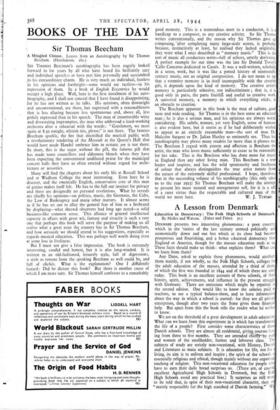BOOKS OF THE DAY
Sir Thomas Beecham
'A Mingled Chime. Leaves from an Autobiography by Sir Thomas Beecham. (Hutchinson. r6s.)
SIR THOMAS BEECHAM'S autobiography has been eagerly looked forward to for years by all who have heard his brilliantly racy and individual speeches or have met him personally and succumbed to his extraordinary charm. He is very much an individual, fearless in his opinions and forthright—some would say tactless—in his expression of them. In a book of English Eccentrics he would occupy a high place. Well, here is the first instalment of his auto- biography, and I shall not conceal that I have found it disappointing, for he has not written as he talks. His opinions, often tlosimright and unconventional, are there, but expressed with a reasonableness that is less alluring because less spontaneous and, above all, less pithily expressed than in his speech. The man of innumerable witty and devastating impromptus, the man who addressed a hard-working orchestra after a rehearsal with the words: " Gentlemen, we meet ;again at 8.3o tonight, whitish ties, please," is not there. The famous Beecham sparkle, the fire that electrified the musical public with a revolutionary rendering of the Messiah at the Queen's Hall that would have made Handel embrace him in ecstatic soy is not there. In short, this is the sugar without the pill, the famous pill that has made town councillors and aldermen blench when they have been expecting the conventional undiluted praise for the municipal concert halls they have so often erected without regard for archi- tecture or acoustics.
Many will find the chapters about his early life at Rossall School and at Wadham College the most interesting. Even here he is discreet, and the essentially English, conservative core of this man of genius makes itself felt. He has to the full our instinct for privacy and there are designedly no personal revelations. What he reveals are chiefly his opinions—on politics, music, the Germans, the Celts, the Law of Bankruptcy and many other matters. It almost seems as if he has set out to allay the general fear of him as a firebrand by displaying—what shrewd observers had long ago noted—a solid business-like common sense. This alliance of general intellectual capacity in affairs with great wit, fantasy and vivacity is such a rare one that perhaps this book will serve the purpose of making us all realise what a great asset the country has in Sir Thomas Beecham, and how seriously we should attend to his suggestions, especially as regards musical education. This was perhaps well worth doing even at some loss in liveliness.
But I must not give a false impression. The book is extremely interesting, candid and honest, but it is also long-winded. It is written in an old-fashioned, leisurely style, full of digressions, a style as remote from the speaking Beecham as well could be, and full of clichés. What is the explanation? One I diffidently hazard: Did he dictate this book? But there is another cause of which I am more state. Sir Thomas himself confesses to a remarkably good memory, This is a tremendous asset to a conductor, it is handicap to a composer, to any creative activity. So Sir Thomas writes conventionally, and the reason why Sir Thomas gave up composing, 'after completing many large-scale scores,. is probably because, instinctively at least, he realised they lacked originality, they_ were what I once described as " memory music." This is the sort of music all conductors write—full of echoes, utterly derivatixe. A perfect example for our time was the late Sir Donald Towers 'Cello Concerto dedicated to Casals. It was a well-written, scholarly in a sense, work, but it was like a potted history of nineteenth- century music, not an original composition. I do not mean to say that a retentive memory is in itself incompatible with the creatite gift, it depends upon the kind of memory'. The creative artist's memory is particularly selective, not indiscriminate ; that is, it is good only in parts, the parts fruitful and useful to creative work. A universal memory, a memory in which everything sticks, is an obstacle to creation.
The Beecham apparent in this book is the man of culture, good taste and wide reading. Sir Thomas is in the best sense an educated man ; he is also a serious man, and his opinions are always worth considering. His subtle, mature, yet very English, sense of humour is also evident here, but it seems as if he had deliberately wished to appear as an entirely reasonable man—the sort of man Dr. Malcolm Sargent or Dr. Julian Huxley so eminently are. Thus his autobiography may please many readers far more than it pleases me. The Beecham I regard with esteem and affection is Beecham the artist, the man who loves music sufficiently to cease to be reasonable for her sake. This is the Beecham who has done more for music in England than any other living man. This Beecham is a true leader and inspirer, and has the wild spontaneity and freshness of colour that always distinguishes the true artist nature from the nature of the extremely skilful professional. I hope, therefore, that in the succeeding volume of his autobiography (this only takes as to the year 1923) Sir Thomas Beecham will make the attempt to present his more natural and unregenerate self, for it is a self of a rarer virtue than the respectable and cultured man of the


























 Previous page
Previous page